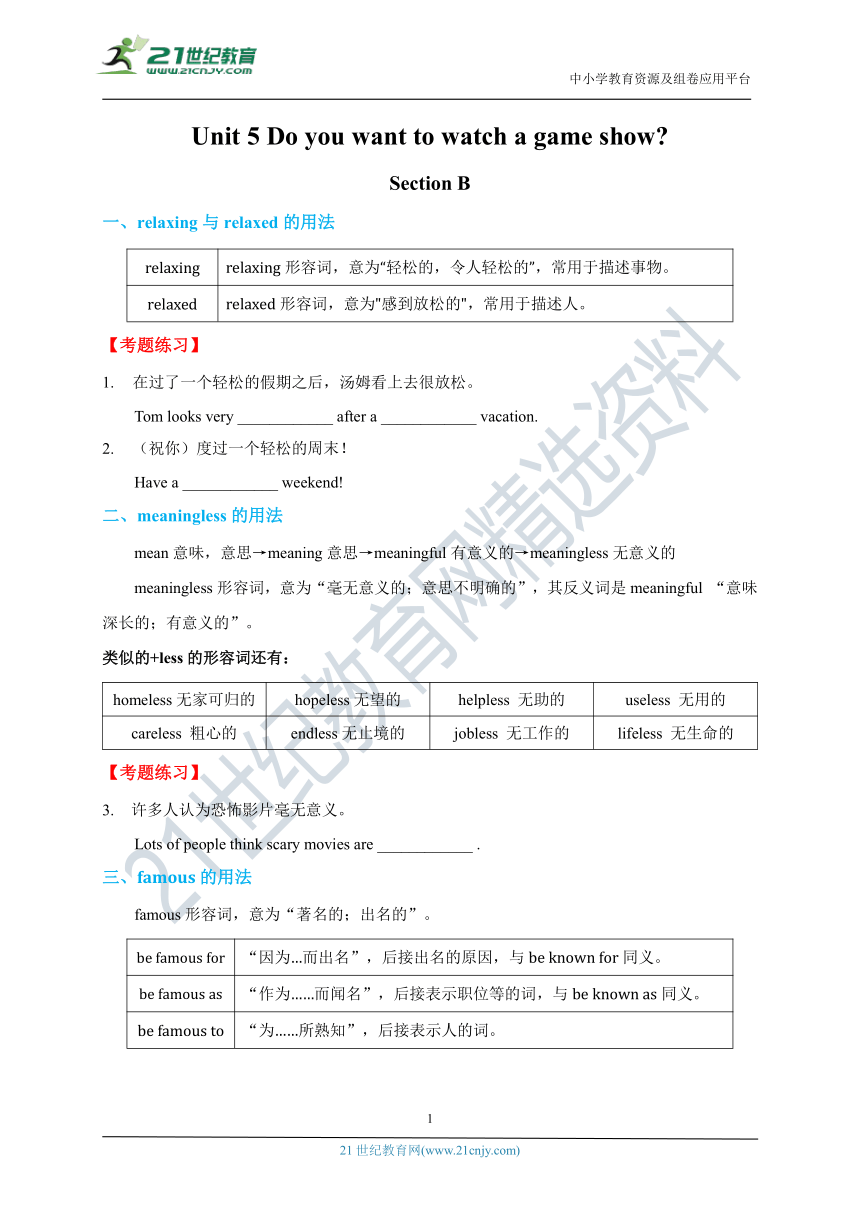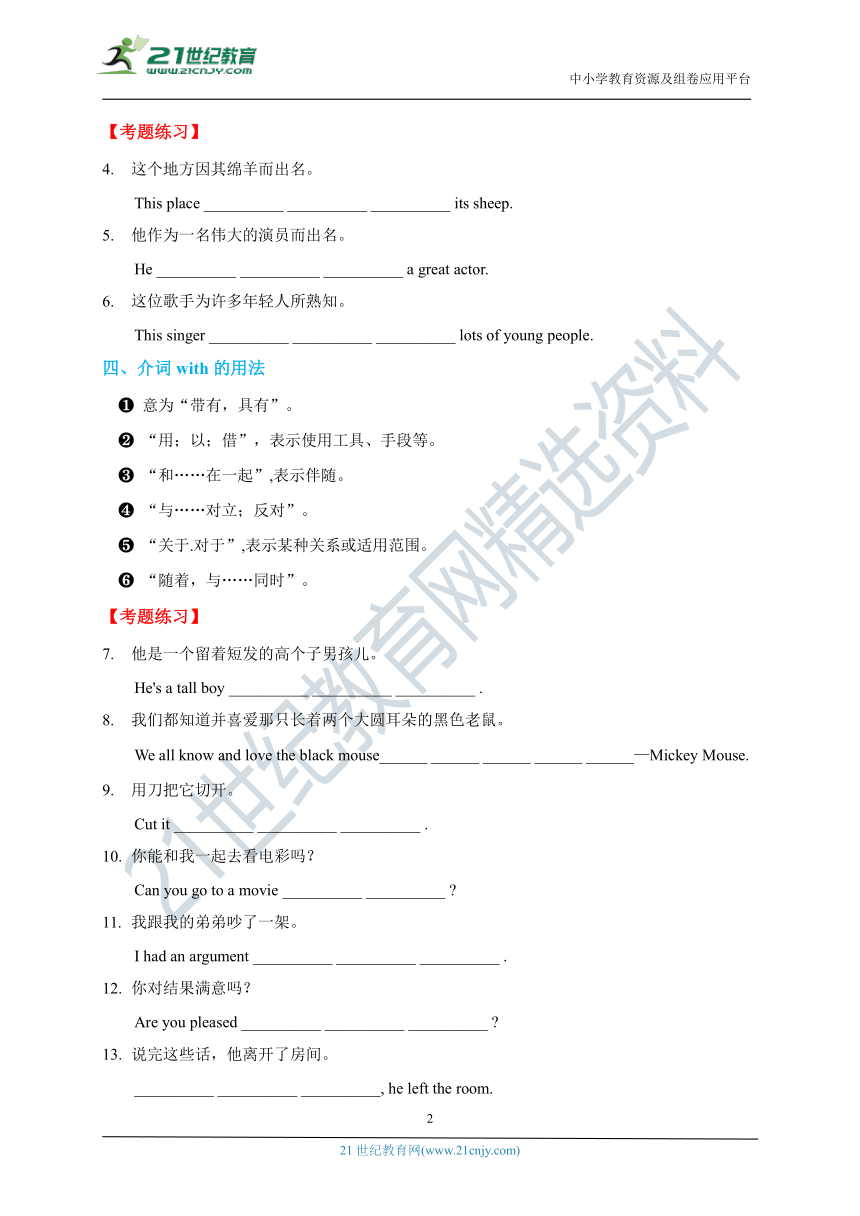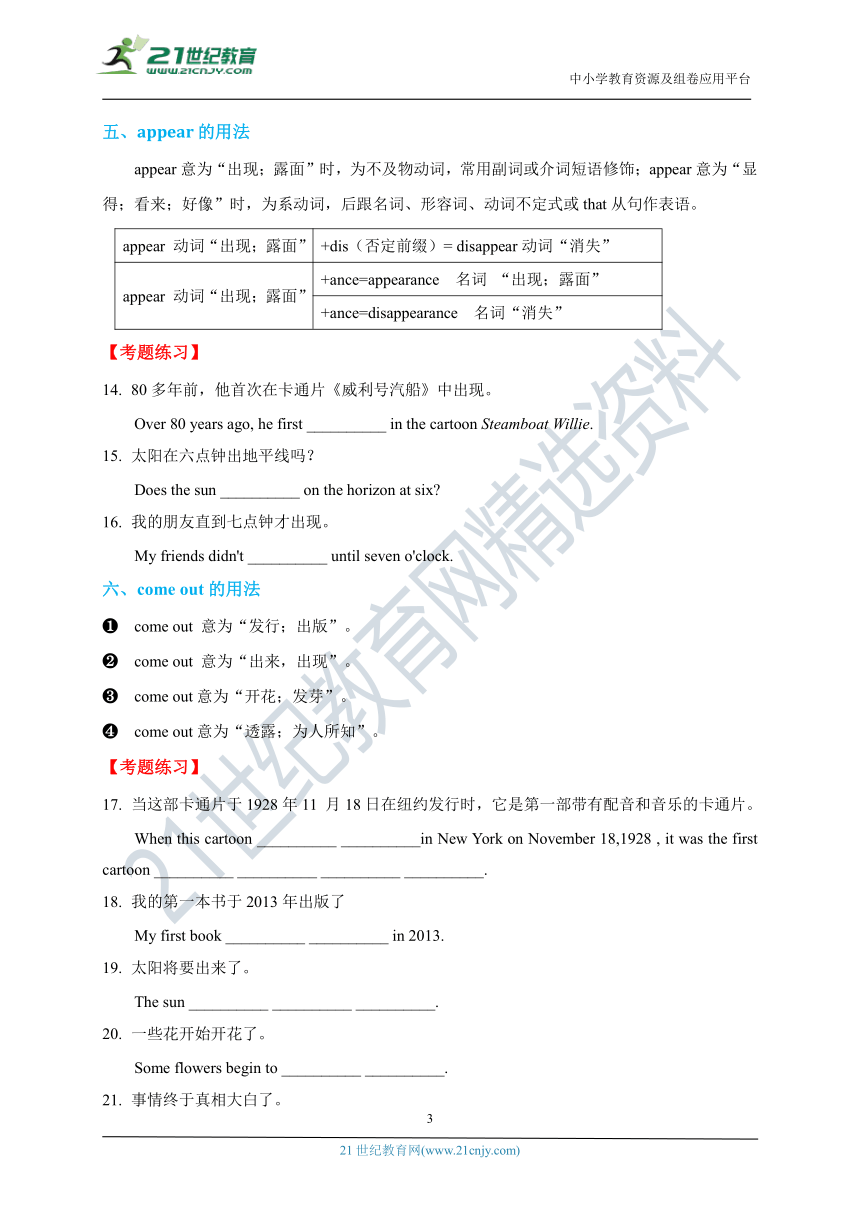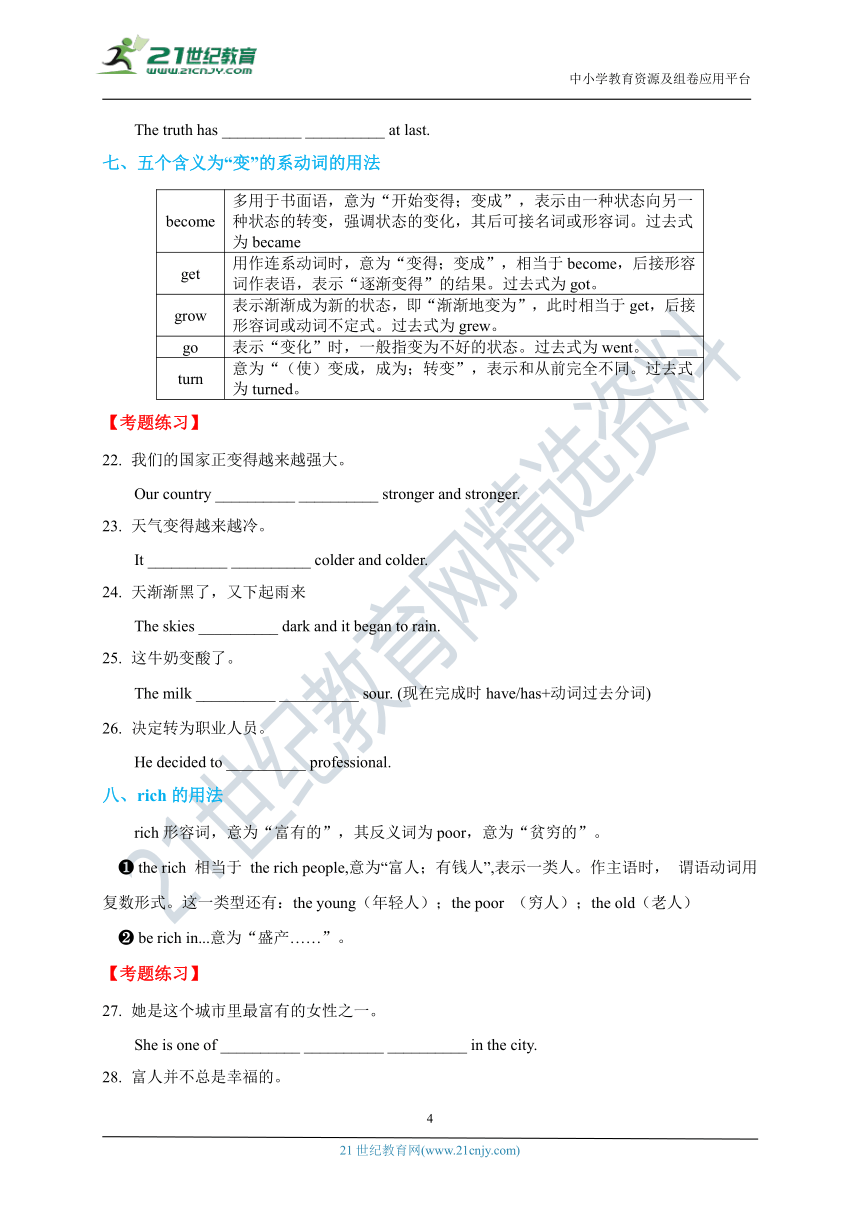Unit 5 Do you want to watch a game show Section B 重要知识考点+练习过关(含答案)
文档属性
| 名称 | Unit 5 Do you want to watch a game show Section B 重要知识考点+练习过关(含答案) |  | |
| 格式 | docx | ||
| 文件大小 | 1018.0KB | ||
| 资源类型 | 试卷 | ||
| 版本资源 | 人教新目标(Go for it)版 | ||
| 科目 | 英语 | ||
| 更新时间 | 2021-09-16 08:10:10 | ||
图片预览





文档简介
Unit
5
Do
you
want
to
watch
a
game
show?
Section
B
一、
relaxing与relaxed的用法
1
二、
meaningless的用法
1
三、
famous的用法
1
四、
介词with的用法
2
五、
appear的用法
3
六、
come
out的用法
3
七、
五个含义为“变”的系动词的用法
4
八、
rich的用法
4
九、
main
reason的用法
5
十、
face的用法
5
十一、
lose的用法
6
十二、
be
ready
to
do
sth.的用法
6
十三、
try
one's
best的用法
6
十四、
dress
up的用法
7
十五、
take
one's
place的用法
7
十六、
do
a
good
job的用法
8
中小学教育资源及组卷应用平台
21世纪教育网
www.21cnjy.com
精品试卷·第
2
页
(共
2
页)
21世纪教育网(www.21cnjy.com)
Unit
5
Do
you
want
to
watch
a
game
show?
Section
B
relaxing与relaxed的用法
relaxing
relaxing形容词,意为“轻松的,令人轻松的”,常用于描述事物。
relaxed
relaxed形容词,意为"感到放松的",常用于描述人。
【考题练习】
在过了一个轻松的假期之后,汤姆看上去很放松。
Tom
looks
very
____________
after
a
____________
vacation.
(祝你)度过一个轻松的周末!
Have
a
____________
weekend!
meaningless的用法
mean意味,意思→meaning意思→meaningful有意义的→meaningless无意义的
meaningless形容词,意为“毫无意义的;意思不明确的”,其反义词是meaningful
“意味深长的;有意义的”。
类似的+less的形容词还有:
homeless无家可归的
hopeless无望的
helpless
无助的
useless
无用的
careless
粗心的
endless无止境的
jobless
无工作的
lifeless
无生命的
【考题练习】
许多人认为恐怖影片毫无意义。
Lots
of
people
think
scary
movies
are
____________
.
famous的用法
famous形容词,意为“著名的;出名的”。
be
famous
for
“因为…而出名”,后接出名的原因,与be
known
for同义。
be
famous
as
“作为……而闻名”,后接表示职位等的词,与be
known
as同义。
be
famous
to
“为……所熟知”,后接表示人的词。
【考题练习】
这个地方因其绵羊而出名。
This
place
__________
__________
__________
its
sheep.
他作为一名伟大的演员而出名。
He
__________
__________
__________
a
great
actor.
这位歌手为许多年轻人所熟知。
This
singer
__________
__________
__________
lots
of
young
people.
介词with的用法
?
意为“带有,具有”。
?
“用;以;借”,表示使用工具、手段等。
?
“和……在一起”,表示伴随。
?
“与……对立;反对”。
?
“关于.对于”,表示某种关系或适用范围。
?
“随着,与……同时”。
【考题练习】
他是一个留着短发的高个子男孩儿。
He's
a
tall
boy
__________
__________
__________
.
我们都知道并喜爱那只长着两个大圆耳朵的黑色老鼠。
We
all
know
and
love
the
black
mouse______
______
______
______
______—Mickey
Mouse.
用刀把它切开。
Cut
it
__________
__________
__________
.
你能和我一起去看电彩吗?
Can
you
go
to
a
movie
__________
__________
?
我跟我的弟弟吵了一架。
I
had
an
argument
__________
__________
__________
.
你对结果满意吗?
Are
you
pleased
__________
__________
__________
?
说完这些话,他离开了房间。
__________
__________
__________,
he
left
the
room.
appear的用法
appear意为“出现;露面”时,为不及物动词,常用副词或介词短语修饰;appear意为“显得;看来;好像”时,为系动词,后跟名词、形容词、动词不定式或that从句作表语。
appear
动词“出现;露面”
+dis(否定前缀)=
disappear动词“消失”
appear
动词“出现;露面”
+ance=appearance
名词
“出现;露面”
+ance=disappearance
名词“消失”
【考题练习】
80多年前,他首次在卡通片《威利号汽船》中出现。
Over
80
years
ago,
he
first
__________
in
the
cartoon
Steamboat
Willie.
太阳在六点钟出地平线吗?
Does
the
sun
__________
on
the
horizon
at
six?
我的朋友直到七点钟才出现。
My
friends
didn't
__________
until
seven
o'clock.
come
out的用法
?
come
out
意为“发行;出版”。
?
come
out
意为“出来,出现”。
?
come
out意为“开花;发芽”。
?
come
out意为“透露;为人所知”。
【考题练习】
当这部卡通片于1928年11
月18日在纽约发行时,它是第一部带有配音和音乐的卡通片。
When
this
cartoon
__________
__________in
New
York
on
November
18,1928
,
it
was
the
first
cartoon
__________
__________
__________
__________.
我的第一本书于2013年出版了
My
first
book
__________
__________
in
2013.
太阳将要出来了。
The
sun
__________
__________
__________.
一些花开始开花了。
Some
flowers
begin
to
__________
__________.
事情终于真相大白了。
The
truth
has
__________
__________
at
last.
五个含义为“变”的系动词的用法
become
多用于书面语,意为“开始变得;变成”,表示由一种状态向另一种状态的转变,强调状态的变化,其后可接名词或形容词。过去式为became
get
用作连系动词时,意为“变得;变成”,相当于become,后接形容词作表语,表示“逐渐变得”的结果。过去式为got。
grow
表示渐渐成为新的状态,即“渐渐地变为”,此时相当于get,后接形容词或动词不定式。过去式为grew。
go
表示“变化”时,一般指变为不好的状态。过去式为went。
turn
意为“(使)变成,成为;转变”,表示和从前完全不同。过去式为turned。
【考题练习】
我们的国家正变得越来越强大。
Our
country
__________
__________
stronger
and
stronger.
天气变得越来越冷。
It
__________
__________
colder
and
colder.
天渐渐黑了,又下起雨来
The
skies
__________
dark
and
it
began
to
rain.
这牛奶变酸了。
The
milk
__________
__________
sour.
(现在完成时have/has+动词过去分词)
决定转为职业人员。
He
decided
to
__________
professional.
rich的用法
rich形容词,意为“富有的”,其反义词为poor,意为“贫穷的”。
?
the
rich
相当于
the
rich
people,意为“富人;有钱人”,表示一类人。作主语时,
谓语动词用复数形式。这一类型还有:the
young(年轻人);the
poor
(穷人);the
old(老人)
?
be
rich
in...意为“盛产……”。
【考题练习】
她是这个城市里最富有的女性之一。
She
is
one
of
__________
__________
__________
in
the
city.
富人并不总是幸福的。
__________
__________
are
not
always
happy.
这个国家盛产石油。
This
country
__________
__________
__________
oil.
main
reason的用法
main形容词,意为“主要的;最重要的”,无比较等级,常在名词前作定语。reason用作可数名词,意为“原因;理由”。the/a
reason
for
(doing)
sth
意为“(做)某事的理由”,“the
reason
why.....”意为“......的原因”。
【考题练习】
主要原因之一是米奇像一个普通人。
One
of
__________
__________
__________
is
that
Mickey
was
like
a
common
man.
中心街是镇里的一条主街道。
Center
Street
is
a
__________
__________
in
town.
你为什么没给出任何理由?
Why
didn't
you
give
any
__________?
你没有理由做那件事。
You
have
no
__________
__________
__________
that.
我们不知道他迟到的原因。
We
don't
know
__________
__________
__________
he
was
late.
face的用法
face用作名词“脸;面孔”,face用作及物动词,意为“面对,面向”。后接名词和代词。
in
the
face
of
意为“面对......”。
【考题练习】
每个人都必须面对现实。
Everyone
__________
__________
the
fact.
他总是全力以赴去面对任何危险。
he
always
tried
to
__________
any
danger.
面对困难不要害怕。
Don't
be
afraid
__________
__________
__________
__________
difficulties.
lose的用法
lose动词,意为“失去;丢失”,其过去式为lost。指因事故或过失失去原有的东西,也可指人专心于某事。lose还可意为“输”,其反义词是win。还有一些固定短语:lose
one's
way
迷路;lose
weight
减肥;lose
interest
in对......失去兴趣。
His
grandmother
lost
her
eyesight.
Tom
lost
himself
in
reading.
汤姆完全沉浸在阅读之中。
They
lost
the
game
because
of
carelessness.
由于粗心,他们输掉了比赛。
【考题练习】
他的奶奶失明了。
His
grandmother
__________
her
eyesight.
汤姆完全沉浸在阅读之中。
Tom
__________
himself
__________
reading.
由于粗心,他们输掉了比赛
They
__________
the
game
because
of
carelessness.
be
ready
to
do
sth.的用法
be
ready
to
do
sth.意为“准备好做某事;愿意做某事”。
【考题练习】
汤姆总是乐于帮助他人。
Tom
__________
always
__________
__________
help
other
people.
对,我们准备好了,可以走了
Right,
we
__________
__________
__________
go.
然而,他总是准备好去尽其所能。
However,
he
was
always
__________
__________
try
his
best.
try
one's
best的用法
try
one's
best意为“尽力;竭尽全力”,与
do
one's
best
同义。try/do
one's
best
to
do
sth.意为“某人尽力做某事”。
【考题练习】
孩子们正尽他们最大努力学习英语。
Children
are
__________
__________
__________
to
learn
English.
然而,他总是准备好去尽其所能。
However,he
was
always
ready
to
__________
__________
__________.
dress
up的用法
dress
up意为“装扮;乔装打扮”。
dress动词,意为“给……穿衣服”。
dress
宾语通常是人,dress
sb.
意思是“给……穿衣服”;get
dressed
“穿衣服”
dress
oneself“某人自己穿衣服”。
put
on
“穿上,戴上”,强调穿、戴的动作,后接衣服、鞋帽等。
wear
“穿着;戴着”,强调状态,宾语可以是衣帽,也可以是饰品、奖章等
in
介词,后接表示衣服或颜色的词,着重于服装的款式或颜色,它所构成的短语只能作表语或定语。
have
on
have
on
意思是“穿着,戴着”
【考题练习】
她装扮成一个男孩子替父从军打仗。
She
__________
__________
like
a
boy
and
takes
her
father's
place
to
fight
in
the
army.
我儿子现在会自己穿衣服了。
My
son
is
now
able
to
__________
__________
.
如果你要出去,穿上你的厚大衣。
__________
__________
your
heavy
coat
if
you
are
going
out.
你最好穿蓝色或黑色裤子配棕色鞋子。
You'd
better
__________
blue
or
black
pants
with
brown
shoes.
这是一张穿着黑色外套的年轻人的照片。
This
is
a
picture
of
a
young
man
__________
a
black
coat.
take
one's
place的用法
take
one's
place意为“代替;替换”,与
take
the
place
of
sb.同义。不要与take
place“发生;举行”记错了。
【考题练习】
昨天我代替妈妈去看电影。
I
__________
__________
__________
__________
to
see
the
film
yesterday.
她装扮成一个男孩子替父从军打仗。
She
dresses
up
like
a
boy
and
________
________
________
________
to
fight
in
the
army.
明天下午要开班会。
A
class
meeting
is
to
__________
__________
tomorrow
afternoon.
The
manager
is
going
on
business.
Who
can
take
his
place?(改为同义句)
The
manager
is
going
on
business.
Who
can
_______
_______
_______
_______
the
manager?
do
a
good
job的用法
do
a
good
job意为“干得好”,相当于
do
well,用于夸奖某人的工作或表现。
【考题练习】
在才艺表演中她表现得很好。
She
________
________
________
________
in
the
talent
show.
他们在影片中表现得很好。
they
________
________
________
________
in
the
movie.
参
考
答
案
relaxed;relaxing
relaxing
meaningless
is
famous
for
is
famous
as
is
famous
to
with
short
hair
with
two
large
round
ears
with
a
knife
with
me
with
my
brother
with
the
result
With
these
words
appeared
appear
appear
came
out;with
sound
and
music
came
out
is
coming
out
come
out
come
out
is
becoming
is
getting
grew
has
gone
turn
the
richest
women
The
rich
is
rich
in
the
main
reasons
main
street
reasons
reason
for
doing
the
reason
why
must
face
face
in
the
face
of
lost
lost;in
lost
is;
ready
to
are
ready
to
ready
to
trying/doing
their
best
try
his
best.
dresses
up
dress
himself
Put
on
wear
in
took
my
mother's
place
takes
her
father's
place
take
place
take
the
place
of
did
a
good
job
did
a
good
job
21世纪教育网(www.21cnjy.com)
5
Do
you
want
to
watch
a
game
show?
Section
B
一、
relaxing与relaxed的用法
1
二、
meaningless的用法
1
三、
famous的用法
1
四、
介词with的用法
2
五、
appear的用法
3
六、
come
out的用法
3
七、
五个含义为“变”的系动词的用法
4
八、
rich的用法
4
九、
main
reason的用法
5
十、
face的用法
5
十一、
lose的用法
6
十二、
be
ready
to
do
sth.的用法
6
十三、
try
one's
best的用法
6
十四、
dress
up的用法
7
十五、
take
one's
place的用法
7
十六、
do
a
good
job的用法
8
中小学教育资源及组卷应用平台
21世纪教育网
www.21cnjy.com
精品试卷·第
2
页
(共
2
页)
21世纪教育网(www.21cnjy.com)
Unit
5
Do
you
want
to
watch
a
game
show?
Section
B
relaxing与relaxed的用法
relaxing
relaxing形容词,意为“轻松的,令人轻松的”,常用于描述事物。
relaxed
relaxed形容词,意为"感到放松的",常用于描述人。
【考题练习】
在过了一个轻松的假期之后,汤姆看上去很放松。
Tom
looks
very
____________
after
a
____________
vacation.
(祝你)度过一个轻松的周末!
Have
a
____________
weekend!
meaningless的用法
mean意味,意思→meaning意思→meaningful有意义的→meaningless无意义的
meaningless形容词,意为“毫无意义的;意思不明确的”,其反义词是meaningful
“意味深长的;有意义的”。
类似的+less的形容词还有:
homeless无家可归的
hopeless无望的
helpless
无助的
useless
无用的
careless
粗心的
endless无止境的
jobless
无工作的
lifeless
无生命的
【考题练习】
许多人认为恐怖影片毫无意义。
Lots
of
people
think
scary
movies
are
____________
.
famous的用法
famous形容词,意为“著名的;出名的”。
be
famous
for
“因为…而出名”,后接出名的原因,与be
known
for同义。
be
famous
as
“作为……而闻名”,后接表示职位等的词,与be
known
as同义。
be
famous
to
“为……所熟知”,后接表示人的词。
【考题练习】
这个地方因其绵羊而出名。
This
place
__________
__________
__________
its
sheep.
他作为一名伟大的演员而出名。
He
__________
__________
__________
a
great
actor.
这位歌手为许多年轻人所熟知。
This
singer
__________
__________
__________
lots
of
young
people.
介词with的用法
?
意为“带有,具有”。
?
“用;以;借”,表示使用工具、手段等。
?
“和……在一起”,表示伴随。
?
“与……对立;反对”。
?
“关于.对于”,表示某种关系或适用范围。
?
“随着,与……同时”。
【考题练习】
他是一个留着短发的高个子男孩儿。
He's
a
tall
boy
__________
__________
__________
.
我们都知道并喜爱那只长着两个大圆耳朵的黑色老鼠。
We
all
know
and
love
the
black
mouse______
______
______
______
______—Mickey
Mouse.
用刀把它切开。
Cut
it
__________
__________
__________
.
你能和我一起去看电彩吗?
Can
you
go
to
a
movie
__________
__________
?
我跟我的弟弟吵了一架。
I
had
an
argument
__________
__________
__________
.
你对结果满意吗?
Are
you
pleased
__________
__________
__________
?
说完这些话,他离开了房间。
__________
__________
__________,
he
left
the
room.
appear的用法
appear意为“出现;露面”时,为不及物动词,常用副词或介词短语修饰;appear意为“显得;看来;好像”时,为系动词,后跟名词、形容词、动词不定式或that从句作表语。
appear
动词“出现;露面”
+dis(否定前缀)=
disappear动词“消失”
appear
动词“出现;露面”
+ance=appearance
名词
“出现;露面”
+ance=disappearance
名词“消失”
【考题练习】
80多年前,他首次在卡通片《威利号汽船》中出现。
Over
80
years
ago,
he
first
__________
in
the
cartoon
Steamboat
Willie.
太阳在六点钟出地平线吗?
Does
the
sun
__________
on
the
horizon
at
six?
我的朋友直到七点钟才出现。
My
friends
didn't
__________
until
seven
o'clock.
come
out的用法
?
come
out
意为“发行;出版”。
?
come
out
意为“出来,出现”。
?
come
out意为“开花;发芽”。
?
come
out意为“透露;为人所知”。
【考题练习】
当这部卡通片于1928年11
月18日在纽约发行时,它是第一部带有配音和音乐的卡通片。
When
this
cartoon
__________
__________in
New
York
on
November
18,1928
,
it
was
the
first
cartoon
__________
__________
__________
__________.
我的第一本书于2013年出版了
My
first
book
__________
__________
in
2013.
太阳将要出来了。
The
sun
__________
__________
__________.
一些花开始开花了。
Some
flowers
begin
to
__________
__________.
事情终于真相大白了。
The
truth
has
__________
__________
at
last.
五个含义为“变”的系动词的用法
become
多用于书面语,意为“开始变得;变成”,表示由一种状态向另一种状态的转变,强调状态的变化,其后可接名词或形容词。过去式为became
get
用作连系动词时,意为“变得;变成”,相当于become,后接形容词作表语,表示“逐渐变得”的结果。过去式为got。
grow
表示渐渐成为新的状态,即“渐渐地变为”,此时相当于get,后接形容词或动词不定式。过去式为grew。
go
表示“变化”时,一般指变为不好的状态。过去式为went。
turn
意为“(使)变成,成为;转变”,表示和从前完全不同。过去式为turned。
【考题练习】
我们的国家正变得越来越强大。
Our
country
__________
__________
stronger
and
stronger.
天气变得越来越冷。
It
__________
__________
colder
and
colder.
天渐渐黑了,又下起雨来
The
skies
__________
dark
and
it
began
to
rain.
这牛奶变酸了。
The
milk
__________
__________
sour.
(现在完成时have/has+动词过去分词)
决定转为职业人员。
He
decided
to
__________
professional.
rich的用法
rich形容词,意为“富有的”,其反义词为poor,意为“贫穷的”。
?
the
rich
相当于
the
rich
people,意为“富人;有钱人”,表示一类人。作主语时,
谓语动词用复数形式。这一类型还有:the
young(年轻人);the
poor
(穷人);the
old(老人)
?
be
rich
in...意为“盛产……”。
【考题练习】
她是这个城市里最富有的女性之一。
She
is
one
of
__________
__________
__________
in
the
city.
富人并不总是幸福的。
__________
__________
are
not
always
happy.
这个国家盛产石油。
This
country
__________
__________
__________
oil.
main
reason的用法
main形容词,意为“主要的;最重要的”,无比较等级,常在名词前作定语。reason用作可数名词,意为“原因;理由”。the/a
reason
for
(doing)
sth
意为“(做)某事的理由”,“the
reason
why.....”意为“......的原因”。
【考题练习】
主要原因之一是米奇像一个普通人。
One
of
__________
__________
__________
is
that
Mickey
was
like
a
common
man.
中心街是镇里的一条主街道。
Center
Street
is
a
__________
__________
in
town.
你为什么没给出任何理由?
Why
didn't
you
give
any
__________?
你没有理由做那件事。
You
have
no
__________
__________
__________
that.
我们不知道他迟到的原因。
We
don't
know
__________
__________
__________
he
was
late.
face的用法
face用作名词“脸;面孔”,face用作及物动词,意为“面对,面向”。后接名词和代词。
in
the
face
of
意为“面对......”。
【考题练习】
每个人都必须面对现实。
Everyone
__________
__________
the
fact.
他总是全力以赴去面对任何危险。
he
always
tried
to
__________
any
danger.
面对困难不要害怕。
Don't
be
afraid
__________
__________
__________
__________
difficulties.
lose的用法
lose动词,意为“失去;丢失”,其过去式为lost。指因事故或过失失去原有的东西,也可指人专心于某事。lose还可意为“输”,其反义词是win。还有一些固定短语:lose
one's
way
迷路;lose
weight
减肥;lose
interest
in对......失去兴趣。
His
grandmother
lost
her
eyesight.
Tom
lost
himself
in
reading.
汤姆完全沉浸在阅读之中。
They
lost
the
game
because
of
carelessness.
由于粗心,他们输掉了比赛。
【考题练习】
他的奶奶失明了。
His
grandmother
__________
her
eyesight.
汤姆完全沉浸在阅读之中。
Tom
__________
himself
__________
reading.
由于粗心,他们输掉了比赛
They
__________
the
game
because
of
carelessness.
be
ready
to
do
sth.的用法
be
ready
to
do
sth.意为“准备好做某事;愿意做某事”。
【考题练习】
汤姆总是乐于帮助他人。
Tom
__________
always
__________
__________
help
other
people.
对,我们准备好了,可以走了
Right,
we
__________
__________
__________
go.
然而,他总是准备好去尽其所能。
However,
he
was
always
__________
__________
try
his
best.
try
one's
best的用法
try
one's
best意为“尽力;竭尽全力”,与
do
one's
best
同义。try/do
one's
best
to
do
sth.意为“某人尽力做某事”。
【考题练习】
孩子们正尽他们最大努力学习英语。
Children
are
__________
__________
__________
to
learn
English.
然而,他总是准备好去尽其所能。
However,he
was
always
ready
to
__________
__________
__________.
dress
up的用法
dress
up意为“装扮;乔装打扮”。
dress动词,意为“给……穿衣服”。
dress
宾语通常是人,dress
sb.
意思是“给……穿衣服”;get
dressed
“穿衣服”
dress
oneself“某人自己穿衣服”。
put
on
“穿上,戴上”,强调穿、戴的动作,后接衣服、鞋帽等。
wear
“穿着;戴着”,强调状态,宾语可以是衣帽,也可以是饰品、奖章等
in
介词,后接表示衣服或颜色的词,着重于服装的款式或颜色,它所构成的短语只能作表语或定语。
have
on
have
on
意思是“穿着,戴着”
【考题练习】
她装扮成一个男孩子替父从军打仗。
She
__________
__________
like
a
boy
and
takes
her
father's
place
to
fight
in
the
army.
我儿子现在会自己穿衣服了。
My
son
is
now
able
to
__________
__________
.
如果你要出去,穿上你的厚大衣。
__________
__________
your
heavy
coat
if
you
are
going
out.
你最好穿蓝色或黑色裤子配棕色鞋子。
You'd
better
__________
blue
or
black
pants
with
brown
shoes.
这是一张穿着黑色外套的年轻人的照片。
This
is
a
picture
of
a
young
man
__________
a
black
coat.
take
one's
place的用法
take
one's
place意为“代替;替换”,与
take
the
place
of
sb.同义。不要与take
place“发生;举行”记错了。
【考题练习】
昨天我代替妈妈去看电影。
I
__________
__________
__________
__________
to
see
the
film
yesterday.
她装扮成一个男孩子替父从军打仗。
She
dresses
up
like
a
boy
and
________
________
________
________
to
fight
in
the
army.
明天下午要开班会。
A
class
meeting
is
to
__________
__________
tomorrow
afternoon.
The
manager
is
going
on
business.
Who
can
take
his
place?(改为同义句)
The
manager
is
going
on
business.
Who
can
_______
_______
_______
_______
the
manager?
do
a
good
job的用法
do
a
good
job意为“干得好”,相当于
do
well,用于夸奖某人的工作或表现。
【考题练习】
在才艺表演中她表现得很好。
She
________
________
________
________
in
the
talent
show.
他们在影片中表现得很好。
they
________
________
________
________
in
the
movie.
参
考
答
案
relaxed;relaxing
relaxing
meaningless
is
famous
for
is
famous
as
is
famous
to
with
short
hair
with
two
large
round
ears
with
a
knife
with
me
with
my
brother
with
the
result
With
these
words
appeared
appear
appear
came
out;with
sound
and
music
came
out
is
coming
out
come
out
come
out
is
becoming
is
getting
grew
has
gone
turn
the
richest
women
The
rich
is
rich
in
the
main
reasons
main
street
reasons
reason
for
doing
the
reason
why
must
face
face
in
the
face
of
lost
lost;in
lost
is;
ready
to
are
ready
to
ready
to
trying/doing
their
best
try
his
best.
dresses
up
dress
himself
Put
on
wear
in
took
my
mother's
place
takes
her
father's
place
take
place
take
the
place
of
did
a
good
job
did
a
good
job
21世纪教育网(www.21cnjy.com)
同课章节目录
- Unit 1 Where did you go on vacation?
- Section A
- Section B
- Unit 2 How often do you exercise?
- Section A
- Section B
- Unit 3 I'm more outgoing than my sister.
- Section A
- Section B
- Unit 4 What's the best movie theater?
- Section A
- Section B
- Unit 5 Do you want to watch a game show?
- Section A
- Section B
- Unit 6 I'm going to study computer science.
- Section A
- Section B
- Unit 7 Will people have robots?
- Section A
- Section B
- Unit 8 How do you make a banana milk shake?
- Section A
- Section B
- Unit 9 Can you come to my party?
- Section A
- Section B
- Unit 10 If you go to the party, you'll have a grea
- Section A
- Section B
